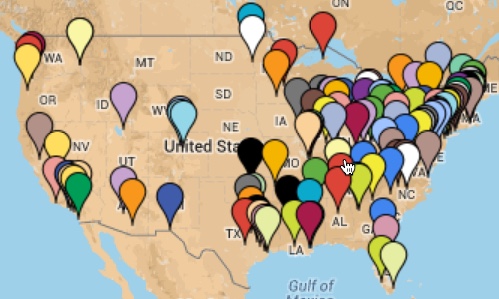U.S. engineering schools to educate 20,000 students to meet grand challenges
March 25, 2015

(credit: National Academy of Engineering)
In a letter of commitment presented to President Barack Obama at the White House Science Fair Monday, more than 120 U.S. engineering schools announced plans to educate a new generation of engineers expressly equipped to tackle some of the most pressing issues facing society in the 21st century.
These “Grand Challenges,” identified through initiatives such as the White House Strategy for American Innovation, the National Academy of Engineering (NAE) Grand Challenges for Engineering, and the United Nations Millennium Development Goals, include complex yet critical goals such as engineering better medicines, making solar energy cost-competitive with coal, securing cyberspace, and advancing personalized learning tools to deliver better education to more individuals.
Each of the 122 signing schools has pledged to graduate a minimum of 20 students per year who have been specially prepared to lead the way in solving such large-scale problems, with the goal of training more than 20,000 formally recognized “Grand Challenge Engineers” over the next decade.
Grand Challenge Engineers will be trained through special programs at each institution that integrate five educational elements: (1) a hands-on research or design project connected to the Grand Challenges; (2) real-world, interdisciplinary experiential learning with clients and mentors; (3) entrepreneurship and innovation experience; (4) global and cross-cultural perspectives; and (5) service-learning.
The training model was inspired by the National Academy of Engineering-endorsed Grand Challenge Scholars Program (GCSP), established in 2009 by Duke’s Pratt School of Engineering, Olin College, and the University of Southern California’s Viterbi School of Engineering in response to the NAE’s 14 Grand Challenges for Engineering in the 21st century.
There are currently 20 active GCSPs and more than 160 NAE-designated Grand Challenge Scholars have graduated to date. Half of the graduates are women—compared with just 19 percent of U.S. undergraduate engineering students—demonstrating the program’s appeal to groups typically underrepresented in engineering.
Examples of GCSP participants working on Grand Challenges include: Alex Caven at the State University of New York (SUNY), who is involved in efforts to provide access to clean water in Haiti; Michaela Rikard, who is working on engineering better medicines at North Carolina State University; Allison Kindig at Iowa State, who is creating sustainable engineering projects in developing countries; and Olin College’s Luke Metz, who is engineering computerized writing aids to advance personalized learning.
More information on this initiative, including a copy of the letter of commitment, is available here.